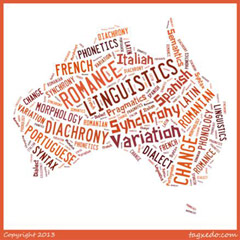
The field of Romance linguistics is a solid research field in the international arena, and we wish to highlight the presence of this field in the Antipodes: there is a wide body of scholars across Australia, New Zealand and the surrounding region conducting research on Romance languages, and several varieties of Romance languages are spoken around the Pacific Rim (including Spanish, French, Portuguese and Italian).
RomLA is a virtual centre, which serves to bring together scholars working on linguistic analyses of Romance languages in the Antipodes and beyond, providing a forum for sharing findings, for exploring issues, and for keeping us all informed of advances in the field across the globe. The focus of this group lies primarily on the structural aspects of linguistics, analysed with a variety of frameworks.
RomLA research areas
 Membership of RomLA is open to anyone who is working in, or who has an interest in working in, any of the following areas, as they pertain to Romance languages:
Membership of RomLA is open to anyone who is working in, or who has an interest in working in, any of the following areas, as they pertain to Romance languages:
- Phonetics and phonology
- Morphology and syntax
- Semantics and pragmatics
- Language variation and change
- Historical linguistics
- First- and second-language acquisition
- Bilingualism
- Sociolinguistics
Membership
RomLA is hosted by the Spanish program, in the School of Literature, Languages and Linguistics at ANU, which currently offers the only minor in Hispanic Linguistics in Australia. We invite fellow linguists with a research interest in the areas listed above to join.
RomLA’s founding members are:
- Manuel Delicado Cantero. Manuel’s areas of research include Romance/Spanish historical syntax (with special attention to prepositional finite clauses), Spanish formal syntax, and pronunciation pedagogy.
- Elisabeth Mayer. Elisabeth’s areas of research include language contact and change and variation in non-standardized dialects, with special attention to clitics and information structure.
- Catherine Travis. Catherine’s primary area of research is Variationist sociolinguistics; she is particularly interested in language contact, including Spanish in the USA and immigrant varieties in Australia.